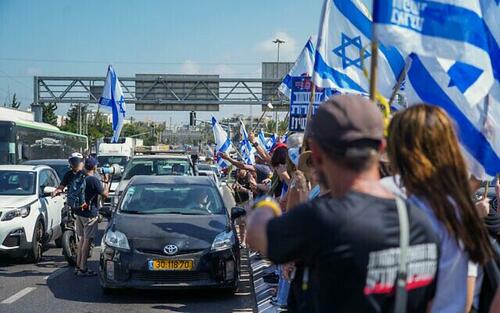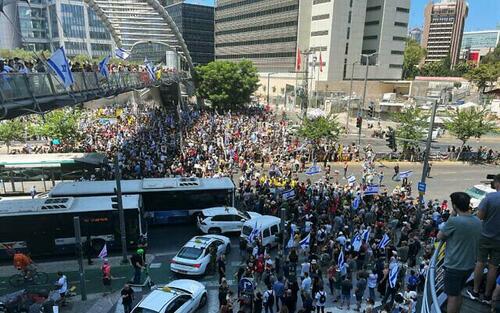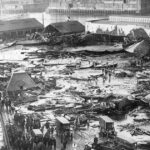
What by many accounts is the largest protest Israel has ever seen in its history filled the streets of Tel Aviv overnight, with more expected Monday, in the wake of Israel recovering the bodies of six Israeli hostages who were held in a Gaza tunnel.
Estimates by journalists said the anti-Netanyahu protest ranged anywhere from 300,000+ to 750,000 people. They accuse the Israeli prime minister of intentionally stalling and thwarting a hostage swap deal with Hamas, instead prioritizing the military operation which could put some 100 remaining captives in harm's way. Watch: the largest rally of the war...
Wow. Aerial video of massive protest in Tel Aviv, Israel tonight of nearly 300,000 people, demanding a ceasefire hours after bodies of 6 hostages were retrieved from Gaza tunnel. Largest rally since war: pic.twitter.com/2KtqWUk7ef
— Joyce Karam (@Joyce_Karam) September 1, 2024
"For 11 months, the Israeli government led by Netanyahu failed to do what a government is expected to do — return its sons and daughters home," The Hostages and Missing Families Forum said in a fresh statement. "A deal for the return of the abductees has been on the table for over two months. If it weren’t for the thwarting [of the deal], the excuses, and the spins, the abductees whose deaths we learned of this morning would probably be alive."
Among the hostages was an Israeli American. The deceased and recovered bodies have been identified as American Hersh Goldberg-Polin, and Eden Yerushalmi, Ori Danino, Alex Lobanov, Carmel Gat, and Almog Sarusi.
The IDF had stated it believes they had been shot not long before its troops reached the tunnels under Rafah. Subsequently health authorities announced they were likely killed 48 to 72 hours before their autopsy, and that they were all executed at close range by multiple bullets.
All of these emerging details have only further served to outrage the victims' families as well as demonstrators, who are calling for a new government. Huge protests have taken over parts of Jerusalem as well, and in front of government buildings.
Meanwhile, exacerbating the political divide over Gaza policy is the new announcement by Israel's largest labor union the Histadrut, which has called a general nationwide strike to begin Monday. This marks an unprecedented first of the Gaza war.
As tens of thousands protest in Tel Aviv to demand Netanyahu allow a prisoner exchange/ceasefire, Israeli forces are responding with stun grenades.
— Wyatt Reed (@wyattreed13) September 1, 2024
Israel has been at war with its neighbors since its inception. Now it appears it may go to war with itself.pic.twitter.com/55eEI1T40p
The union said it is striking as it's become clear that a truce deal is "more important than anything else," according to the words of Arnon Bar-David, the head of Histadrut. "We are getting body bags instead of a deal."
Israeli media on Monday says the country for some eight hours effectively came to a standstill:
Workers shut down public services, tech firms and other businesses, and activists snarled traffic at intersections across the country Monday as hundreds of thousands of people joined a one-day general strike aimed at pressuring the government to seal a hostage-ceasefire deal in Gaza after the military recovered the bodies of six hostages executed just days ago.
According to more:
With limited bus service forcing commuters to find alternate means of travel and many employees declining to show up for work, activists began gathering Monday morning at major junctions and on other roads around the country.
Demonstrators blocked major streets in Tel Aviv and shut down highways leading to the city from the north and east, bringing traffic on the Route 1 and Route 4 highways to a standstill. To the deafening beat of drums, they vowed not to abandon those still believed held hostage in Gaza, and accused the government of leaving them to die there.
Protesters have been heard chanting throughout the day, "Why are they still in Gaza" - in reference to the hostages.

The pressure from the streets, and now that the large one-day union strike is sure to deal a blow to the economy (with future strikes still a looming threat), will increasingly result in political division at the top of the government.
However, an Israeli court has ruled against the Histadrut strike, and ordered workers back to their jobs, a decision which the union says it will respect:
A court ordered strikers back to work Monday afternoon, cutting short a labor action aimed at pressuring the government to seal a ceasefire and hostage deal in Gaza as thousands protested for an agreement nationwide.
Tel Aviv’s labor court ruled that the Histadrut labor federation had until 2:30 p.m. to wrap up a general strike that had shut down government offices and limited access to clinics, banks, public transportation and other services.
There are also widespread reports that during a Sunday night security cabinet meeting Israeli Defense Minister Yoav Gallant confronted Netanyahu.

Gallant told him: "Continuing to impose constraints such as the decision on the Philadelphi corridor will result in us not meeting the goals of the war. The fact that we prioritize the Philadelphi corridor at the cost of the lives of the hostages is a serious moral disgrace," the defense chief said.
What by many accounts is the largest protest Israel has ever seen in its history filled the streets of Tel Aviv overnight, with more expected Monday, in the wake of Israel recovering the bodies of six Israeli hostages who were held in a Gaza tunnel.
Estimates by journalists said the anti-Netanyahu protest ranged anywhere from 300,000+ to 750,000 people. They accuse the Israeli prime minister of intentionally stalling and thwarting a hostage swap deal with Hamas, instead prioritizing the military operation which could put some 100 remaining captives in harm’s way. Watch: the largest rally of the war…
Wow. Aerial video of massive protest in Tel Aviv, Israel tonight of nearly 300,000 people, demanding a ceasefire hours after bodies of 6 hostages were retrieved from Gaza tunnel. Largest rally since war: pic.twitter.com/2KtqWUk7ef
— Joyce Karam (@Joyce_Karam) September 1, 2024
“For 11 months, the Israeli government led by Netanyahu failed to do what a government is expected to do — return its sons and daughters home,” The Hostages and Missing Families Forum said in a fresh statement. “A deal for the return of the abductees has been on the table for over two months. If it weren’t for the thwarting [of the deal], the excuses, and the spins, the abductees whose deaths we learned of this morning would probably be alive.”
Among the hostages was an Israeli American. The deceased and recovered bodies have been identified as American Hersh Goldberg-Polin, and Eden Yerushalmi, Ori Danino, Alex Lobanov, Carmel Gat, and Almog Sarusi.
The IDF had stated it believes they had been shot not long before its troops reached the tunnels under Rafah. Subsequently health authorities announced they were likely killed 48 to 72 hours before their autopsy, and that they were all executed at close range by multiple bullets.
All of these emerging details have only further served to outrage the victims’ families as well as demonstrators, who are calling for a new government. Huge protests have taken over parts of Jerusalem as well, and in front of government buildings.
Meanwhile, exacerbating the political divide over Gaza policy is the new announcement by Israel’s largest labor union the Histadrut, which has called a general nationwide strike to begin Monday. This marks an unprecedented first of the Gaza war.
As tens of thousands protest in Tel Aviv to demand Netanyahu allow a prisoner exchange/ceasefire, Israeli forces are responding with stun grenades.
Israel has been at war with its neighbors since its inception. Now it appears it may go to war with itself.pic.twitter.com/55eEI1T40p
— Wyatt Reed (@wyattreed13) September 1, 2024
The union said it is striking as it’s become clear that a truce deal is “more important than anything else,” according to the words of Arnon Bar-David, the head of Histadrut. “We are getting body bags instead of a deal.”
Israeli media on Monday says the country for some eight hours effectively came to a standstill:
Workers shut down public services, tech firms and other businesses, and activists snarled traffic at intersections across the country Monday as hundreds of thousands of people joined a one-day general strike aimed at pressuring the government to seal a hostage-ceasefire deal in Gaza after the military recovered the bodies of six hostages executed just days ago.
According to more:
With limited bus service forcing commuters to find alternate means of travel and many employees declining to show up for work, activists began gathering Monday morning at major junctions and on other roads around the country.
Demonstrators blocked major streets in Tel Aviv and shut down highways leading to the city from the north and east, bringing traffic on the Route 1 and Route 4 highways to a standstill. To the deafening beat of drums, they vowed not to abandon those still believed held hostage in Gaza, and accused the government of leaving them to die there.
Protesters have been heard chanting throughout the day, “Why are they still in Gaza” – in reference to the hostages.

The pressure from the streets, and now that the large one-day union strike is sure to deal a blow to the economy (with future strikes still a looming threat), will increasingly result in political division at the top of the government.
However, an Israeli court has ruled against the Histadrut strike, and ordered workers back to their jobs, a decision which the union says it will respect:
A court ordered strikers back to work Monday afternoon, cutting short a labor action aimed at pressuring the government to seal a ceasefire and hostage deal in Gaza as thousands protested for an agreement nationwide.
Tel Aviv’s labor court ruled that the Histadrut labor federation had until 2:30 p.m. to wrap up a general strike that had shut down government offices and limited access to clinics, banks, public transportation and other services.
There are also widespread reports that during a Sunday night security cabinet meeting Israeli Defense Minister Yoav Gallant confronted Netanyahu.

Gallant told him: “Continuing to impose constraints such as the decision on the Philadelphi corridor will result in us not meeting the goals of the war. The fact that we prioritize the Philadelphi corridor at the cost of the lives of the hostages is a serious moral disgrace,” the defense chief said.
Loading…






